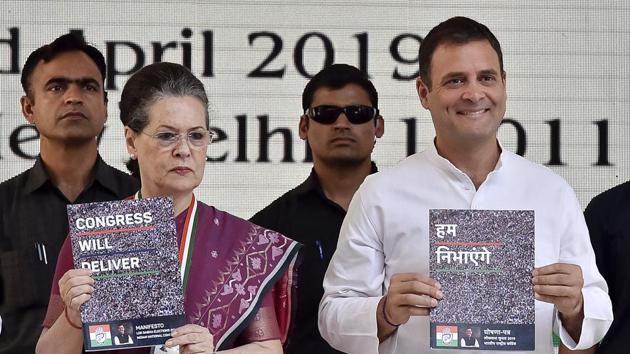Lok Sabha election 2019: Separate farm budget, no jail for loan defaults on Congress agenda
The party’s 22-point farm and rural agenda focuses on greater state intervention and public investment in the sector hit by a long spell of poor returns.
The Congress on Tuesday promised a separate agriculture budget, more loan waivers and decriminalisation of farm loan defaults as part of a string of interventions in a poll manifesto focused heavily on welfare and rural agenda.

“The main issues in the country today are unemployment and farmer distress,” said Congress chief Rahul Gandhi.
The party’s 22-point farm and rural agenda focuses on greater state intervention and public investment in the sector hit by a long spell of poor returns.
The Congress promised to make non-payment of loans by farmers a civil offence instead of a criminal one. This is in line with its sustained advocacy of a general loan amnesty to woo farmers, which has been central to the party’s agricultural narrative.

The Congress promised farm loan waivers within 10 days of coming to power to address agrarian distress before wresting power from the Bharatiya Janata Party in Madhya Pradesh, Rajasthan and Chhattisgarh in December last year.
“Debt is a civil liability and we will not allow criminal proceedings to be instituted against a farmer who is unable to pay his/her debt,” the manifesto reads.
The party promised to double public investment in agriculture. Over a 33-year period, public capital formation in agriculture, a measure of investments, has declined from 3.9% of agri-GDP in 1980-81 to 2.2% in 2014-15, according to research by the think-tank, Icrier. However, subsidies on fertilisers, power, water and crop insurance etc have shot up from 2.8% to 8% during this period.
A recent study by economist Ashok Gulati showed that public investment had far greater reach in improving farm income than subsidies alone. For instance, every ~1 million (~10 lakh) invested on farm research potentially pulled 328 people out of poverty. Likewise, every rupee spent on agricultural R&D increased farm GDP by ~11.2.
The Congress, if voted to power, also proposes to establish a set of new institutions, including a National Commission on Agricultural Development and Planning. It indicated that it will rely on the Nehruvian model of statist planning in agricultural development. Asked what could be the benefits of a separate farm budget, economist Abhijit Sen said: “Not much.”
Sen, who oversaw agriculture at the erstwhile Planning Commission during the previous Congress-led United Progressive Alliance government, said: “There are things like gender budgeting that usually are part of the main budget. But a separate agriculture budget is a bit of tamasha. The very simple reason is that agriculture is a complicated subject in which there is nothing much the Centre can do alone. A good agricultural programme cuts across many ministries and departments corresponding to these ministries in states.”
Among other important measures, the Congress said it would redesign the country’s flagship farm insurance programme, set up a body focused on small farmers and free up agricultural trade. “Increasing public investment is indeed the crying need from the perspective of a long-term solution to farm productivity and income,” said economist K Mani of the Tamil Nadu Agriculture University.






